牛津创新手册(PPT 30张)
- 格式:ppt
- 大小:854.00 KB
- 文档页数:31

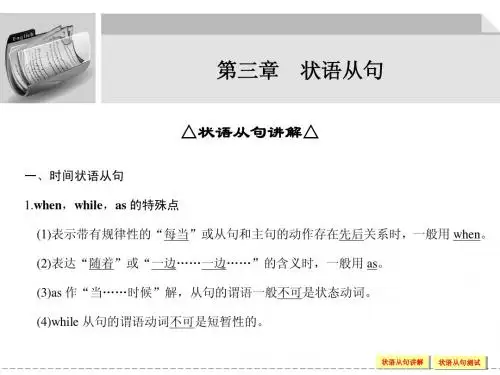
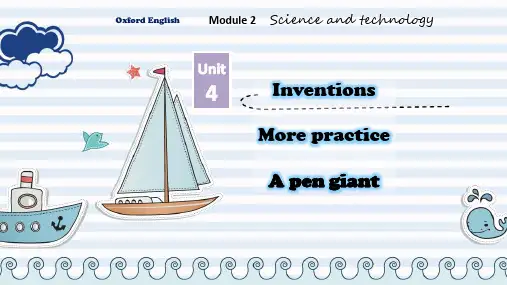
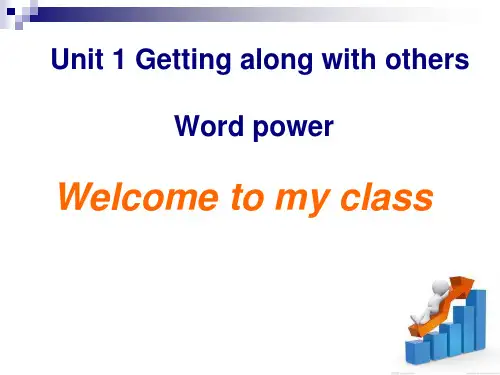
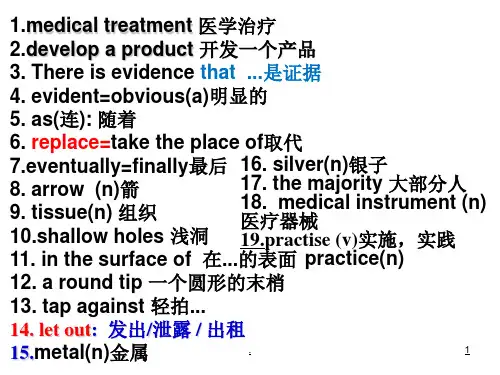
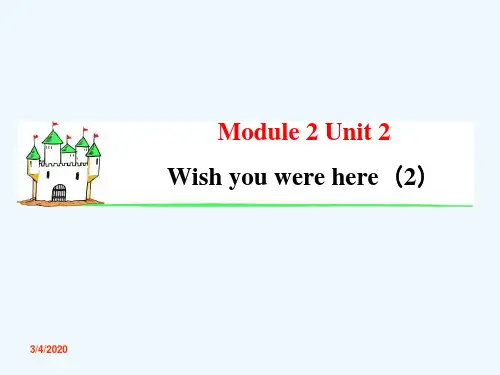
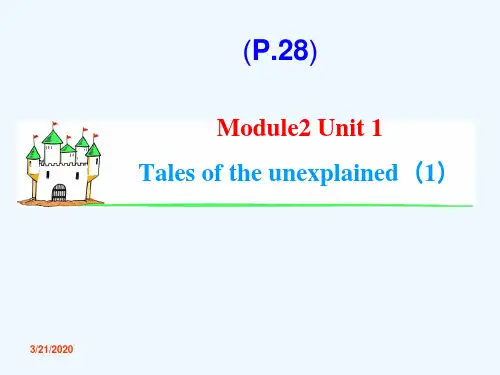
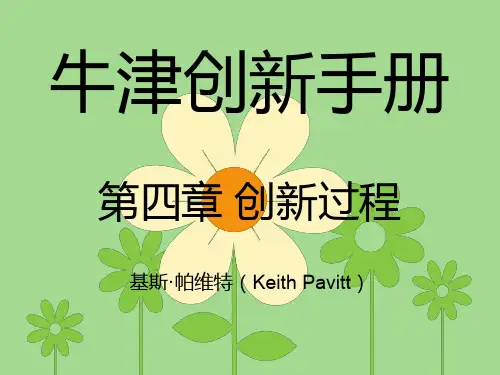
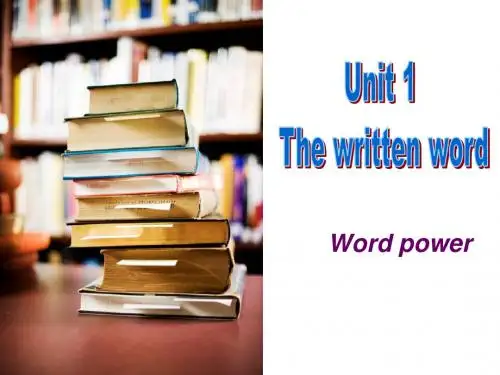
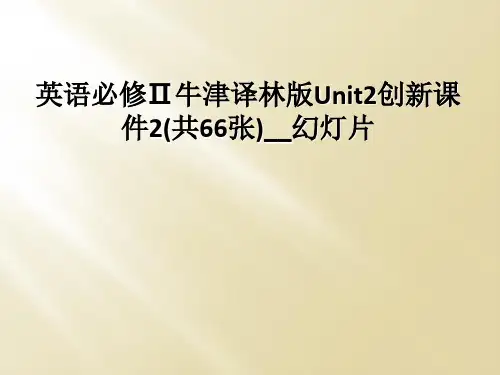
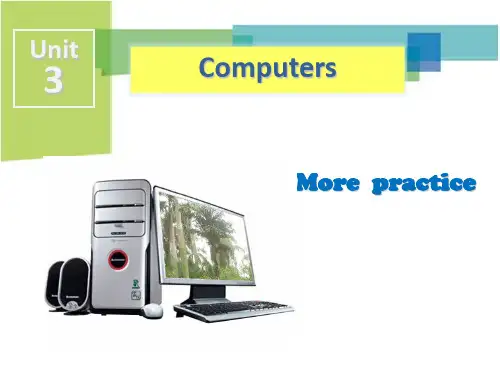
初二牛津课本课件(第7单元)(5)Teaching plan of Chapter fiveSuccess storiesChapter topic overview:The main topic of this chapter is success stories. The main passage is a story about a famous pianist. The Listening section has a note-taking task in which students have to note down information from the telephone message. The Language section deals with the past continuous tense. The main task in the Speaking section is a survey activity about whether students help their parents with housework. The Writing section requires students to write a similar account of a fictional character. Finally, the using English section focuses on how to make pie charts..Period OneTeaching target1.To know some new words about thereading passage.2. To have a warm-up to know about some historical stories.Cartoon talk1Give students some time to look at the cartoon on SB B, page 57. Tell them to read the sentences carefully.2. Meaning of the cartoon:This cartoon focuses on two possible aspects of success: being rich and being famous. It is funny because Hi wants both things, not just one.Teaching courses:a. Pre-chapter activitiesLook at the pictures and answer some questions.●Who is she ?●Is she very famous?●How do you like her ?b. What do you know about…?You are going to read a success story. The people in the pictures below all have been successful. Match the names with their titles.●William (Bill) H. Gates : the co-founder of Microsoft , a leader in the computer and Internet industry.Gates discovered his interest in computers when he was just 13 years old. He studies at HarvardUniversity in the USA. In his junior year, he left Harvard to concentrate on Microsoft. He started thecompany in 1975 with one of his childhood friends. Paul Allen.●Fu Mingxia: a remarkable Chinese diver who has achieved a lot of success in her field. She was bornin Wuhan in Hubei Province, in 1978.She won her first world champion title in 1991,at the age of 12. At the Barcelona Olympic Games in 1992, at the age of 13, shebecame the youngest champion to win a goldmedal.●Jacky Chen : an international actor famous for his action films.c. Pre-reading---Part B Look and thinkAsk the students to listen to the tape about the reading passage. Then answer the following questions.1. Who is the piano prodigy?2. In what way do you think he is successful?3. When we say a person is successful, what do we mean?d. Vocabulary Box.prodigy: talentstunning (adj.): extremely impressiveat a price: involving sth. unpleasantstrict: demanding that rules must beobeyedwhile: during the time that sth. ishappeningquit: leave one?s job, school, etc.academy: a school or college for specialchance: a time when it is possible to dosth.fall ill: become sickin place of: instead offorever : in a situation or state that willalways exist.performance: the act of performing aplay, concert, etc.support: help or encourage someone orsomethinge. Practice----D Find the meaningsD1. Read the sentence belowand replace the words in italics with the words in the box.D2. Find the words in the box from thestory, try to work out their meaningsand then use them to complete thedialogues below.1. A What do you do you think of ______art?B It?s quite different from Chinese art, but itis also very interesting.2. A Is Nancy a member of the school?s violinclub?B Yes. Her ________ last night was great.3. A Hi, Jane. Would you like to go to thecinema with me this evening? I have got two tickets.B I?d really love to, but I h ave to do myhomework. My parents are very _____about it4. A My brother love basketball and henever misses a ________ to playbasketball with his friends.B It is my favorite sport too. Maybe your brother and I can play basketball together someday. D3 Choose the best meanings for theseexpressions from the story.1. He is stunning means that he ______.a has great talentb looks great2. His success came at a price means that hebecame successful_____.a easyb after much hard work3. A pianist suddenly fell ill means he or shesuddenly ______.a got sickb fell down and hurt4. Lang Lang was chosen to play in place ofthat pianist means that he played _____that pianist.a together withb instead off. Conclusionf. Assignments.a. Recite the new words and expressions.(from actor to orchestra)b. Listen to the tape about the reading passage three times.Period TwoTeaching target1. Revision2. While-reading.a. Listen to the pa ssage carefully and say “T” or “F” to each statement?b. Look through the text and fill in the form.3. To read it further and have a competition between boys and girls. Teaching courses:a. Review the new words and expressions.Fill in the blanks with the correct words.1.She felt honored to be accepted by theRoyal __________of Music.2.Her nice figure came___________.3.It is a ______she has long been waiting for./doc/c9551c4a2e3f5727a5e9626c.html ne ______after she got caught in the rain.5.He kept telling himself that it would notlast_____.6. You can use chicken_____ pork in this dish.7. The ___________started at 7 p.m.8. He is regarded as a tennis _______becausehe won ten tennis championships by age 18.9. I have decided to ______my job unless I getpromoted.10. My parents are always _______with me.11. The sunset looked absolutely__________.12. Most people at the meeting __________theproposal.13. Jim is reading _______his sister wasdoing her homework.b. Readinga). Listen to the passage carefully and say“T” or “F” t o each statement.1. The New York Times described Lang Lang with a short sentence because he was not worth mentioning. F2. Lang Lang?s parents started training him to be a pianist when he was very young. T3. Lang Lang won all his prizes without an effort. F4. Lang Lang?s father took him to Beijing because his job required him to. F5. Lang Lang?s life changed after a successful performance in 1999. T6. Lang lang is complaining about his parents, because they are too strict to him. F b).Look through the text and fill in the form. c). To read the passage further and have a competition between boys and girls. 1. When and where was Lang Lang born?2. What did The New York Times say about Lang Lang?3. What was he doing when he first heard western classical music?4. When did Lang Lang began taking piano lesson?5. When did he win first prize?6. His father was very gentle and patient to him, wasn ?t he?7.What was Lang Lang doing while other children were sleeping in parents arms 8. Why did his father quit the job? 9. When did get his big chance? Did he grasp the chance?10. How many performances does Lang Lang give every years? 11. What does he express to his parents?12. What qualities lead Lang Lang to be a piano prodigy? d). Finish Exx. onPage 61---- E1 and E2c. Conclusiond. Assignments.1). Recite the new words and expressions.(from support to clothing) 2). Read the passage after the tape and try to recite the first two paragraphs.Years Lang Lang’s experiences 1982He was born in Shenyang1985 He began taking piano lessons 1987 He won first prize in the Shenyangpiano competition1991 He entered the finest musicacademy in China1999 He got a big chance and changedhis life forever2008He played for the2008 Olympic GamesPeriod ThreeTeaching target1. To read it intensively and fill in the blanksabout the reading.2. To explain the key points about reading3. Conclude the key phrases.Teaching courses:a. Revision1. Ask some students to recite the first two paragraphs.2. Have a dictation about the new words.b. To read the passage intensively and fill in theblanks.Lang Long is often called piano ____ in China.His growth is much more interesting than theword ______. ______ in Shenyang, Lang Langbegan _______ piano lesson at the age of three.His first prize came only two years later .________ ____ he won many awards. However,Lang Lang?s success came ____ ____ ____. Hisfather was very _____ _____ him. In order totrain him to be more professional, his father____ the job, and help him _____ the finestmusic _________ in China.Lang Lang is not only_________ but also luckyenough. He was Chosen to play ____ ____ ____the absent pianist because of his sudden illnessin a famous musical event. His wonderful______ changed his life ________. Lang langsays he is _________ to his parents becausethey always ________ and _________ him.c. Conclude some important phrases about the reading passage.1. one of …11.of his age2. of our time 12. fall ill3. much more 13. in place of4. be born in 14. such as5. begin doing sth 15. be grateful to6. at the age of 16. have fun7. from then on 17. play games8. at a price 18. for example9.be strict with sb 19. and so on10.be strict in sth 20. be responsible ford. Importance and Difficulty【语言点1】考查actor用合适的词完成句子:Jacky Chan is a great _________ in the world.Zhang Ziyi is a successful _____________.The atmosphere around Earth _____like the glass.解析:act的主要意思是“充当,表演”;它的名词形式有actor (男演员);actress(女演员);注意词组:act like (充当);【语言点2】考查western用合适的词完成句子:1.Xing Jiang is in the _______ of China.2.I don’t like ___________ classical music.解析:west (西);east (东);south(南);north(北);还要注意它们的几个同根词:western(西方的);eastern(东方的);southern(南方的);northern(北方的);【语言点3】考查strict用合适的词完成句子:1.M y teacher is very strict __________us.2.M y mother seems to be strict ____everything.解析:strict 的意思是“严格的”;它有两个重要的词组:be strict with sb (对某人要求严格);be strict in sth (对某事要求严格)【语言点4】考查prepare解释句子:All of us are preparing for the coming party.All of us are getting ready for the coming party.解析:prepare 的意思是“准备”;词组prepare for(为…而准备)常和get ready for 互换.【语言点5】考查in place of解释句子:He was chosen to play in place of his brother.He was chosen to play instead of his brother.解析:注意in place of 和instead of 的意思都是“代替”;如:I didn’t play football. I went to the park.= I went to the park instead of playing football.【语言点5】考查give sb a hand解释句子:I worked out the maths problem because she gave me a hand.I worked out the maths problem because she helped me.解析:give sb a hand 的意思是“帮助某人”;在解释句子中,要和help sb 互换;注意help的其它结构:help sb ( to ) do sth =help sb with sth【语言点6】考查fall ill根据提示,完成句子:I fell ill two days ago.I _______ ________ _______ for two days.解析:fall ill 的意思是“生病”;是不延续动词词组;在现在完成时中,和一段时间连用时,要使用be ill;e. Conclusionf. Assignments:1). Review the language points and finish doing Exx. in Workbook---Vocabulary (Page57)2). Recite the rest four paragraphs.Period FourTeaching target1. Review the reading passage.2. Study the language ---- The past continuous tenseTeaching courses:a. Revision1. Dictation---New words and expressions.2. Complete the following with words you collect from the text.1). 他是我们那个年代最年轻最著名的钢琴家之一He was one of the youngest and most famous _______ of our _____.2). 我出生在1992年一个寒冷的冬天的早晨。